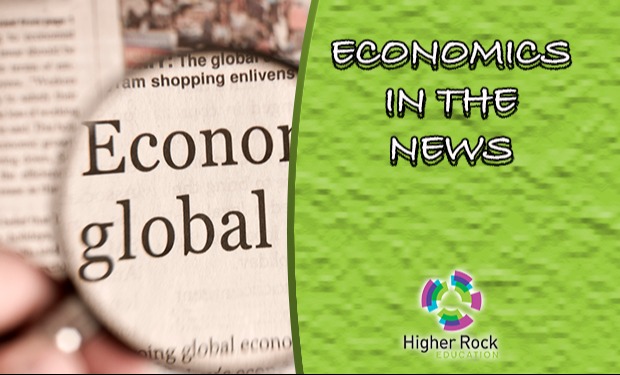
Economics impacts our lives every day. Below are some of the top storylines from this past week related to economics.
o Debit and credit card fees are among the top monthly expenses for many small businesses. Merchants of all sizes paid a total of $172 billion in processing fees in 2023, up from roughly $116 billion in 2019. That has left small business owners in a precarious situation, hesitant to pass the costs to customers in an increasingly cashless society.
When customers swipe their credit card, businesses pay fees to the bank that issues the card, to the payment network, and to payment processing companies – companies such as Square or Toast. The payment paid to payment networks, such as Visa and Mastercard, is usually around two percent and benefits the banks and the networks. Visa and Mastercard are the dominant companies in the industry, together controlling more than 80 percent of the market. The two companies argue robust competition among payment networks. Visa and Mastercard have each raised their fees since the pandemic. Lawmakers and government agencies are taking steps to help rein in the fees, which pleases small business owners. [The New York Times]
o Black Friday used to be filled with tradition for shoppers – waking up early, standing in line in order to get the best deals of the year. However, with the convenience of shopping online and having it shipped directly to your home, shoppers are more frequently opting not to go to the stores.
This year, shoppers spent a record $10.8 billion online, a 10 percent increase over last year, according to Adobe Analytics. Online shoppers spent $11.3 million per minute between 10 a.m. and 2 p.m. In-store shopping traffic declined 8.2 percent comparted to 2023, according to Sensormatic Solutions. [NPR]
o Restaurants are trying to lure diners back to their eateries after restaurant prices surged 30 percent since the COVID-19 pandemic. Chains have turned to promotions and discounts and that has helped with 81 percent of American consumers ordering a fast-food value meal in the last three months. However, are the promotional deals worth it for restaurants?
Deals aren’t always translating to profit and don’t necessarily mean keep customers coming back. KFC parent YUM! Brands and Popeyes owner Restaurant Brands International both tried discounts but they hadn’t increased store traffic as much as hoped. Both chains are now focused on introducing new menu items at lower prices. As a whole, traffic to restaurants was down this year through the month of September. [The Wall Street Journal]
o President-elect Donald Trump announced the selection of Kevin Hassett for the role of director of the White House National Economic Council. The director of the White House National Economic Council is typically responsible for setting the president’s agenda on economic policy matters, including taxes, trade, government spending and more.
Hassett is a conservative economist who previously served on the White House Council of Economic Advisers during Trump’s first term in office. He also advised Trump on economic policy during the 2024 presidential campaign. Hassett has been a longtime advocate of tax cuts and helped provide the economic analyses to support Trump’s 2017 tax law. He is widely viewed by other economists as unlikely for the most dramatic forms of Trump’s proposed tariffs. The selection of Hassett was praised by Ernie Tedeschi – a top economist during President Joe Biden’s term. [The Washington Post]
o Does your family prefer real Christmas trees or fake ones? A study conducted in 2018 over the environmental impact of real and artificial trees over the course of production to disposal found that artificial trees have a more favorable effect on the environment if reused for at least five years.
The study took into account things like the netting around the tree and the water used to keep them alive, versus the plastic packaging tape used on fake-tree boxes and transportation from manufacturers in China. However, environmental groups believe that real trees are better due to the possibility that real trees can be used after use for environmentally friendly purposes, whereas most artificial aren’t recyclable. [NPR]